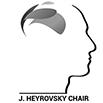Pavel Hobza (Institute of Organic Chemistry and Biochemistry of the AS CR)
Lecture Type
Year
2010
The annual Rudolf Brdička lecture was held on June 23, 2010 at 14:00 in Brdička hall.
“Noncovalent Interactions and their Role in Chemistry and Biochemistry”
Pavel Hobza
Institute of Organic Chemistry and Biochemistry,
Academy of Sciences of Czech Republic
Noncovalent interactions play a key role in biodisciplines and they determined the structure of biosystems. The function of biomacromolecules is largely determined by their structures, e.g. the double helix of DNA is responsible for the storage and transfer of genetic information. The experimental study of noncovalent interactions is still challenging problem and the interpretation is not always unambiguous. On the other hand theoretical methods of quantum chemistry combined with methods of molecular dynamics provide a unique and consistent picture of noncovalent interactions under different conditions, e.g. in different environments or at different temperature. In this lecture, different types of noncovalent interactions, their character and their role in nature will be presented. In addition, the reliability of different methods to describe these interactions will be discussed, starting from the most accurate nonempirical approaches with chemical accuracy up to semiempirical and empirical methods which allow to study systems with several thousand of atoms. Finally, selected projects from our laboratory will be briefly presented with a special emphases on in silico drug design.
Some photos illustrating atmosphere of the lecture...
Photo: K. Stejskalová, archive JHI
“Noncovalent Interactions and their Role in Chemistry and Biochemistry”
Pavel Hobza
Institute of Organic Chemistry and Biochemistry,
Academy of Sciences of Czech Republic
Noncovalent interactions play a key role in biodisciplines and they determined the structure of biosystems. The function of biomacromolecules is largely determined by their structures, e.g. the double helix of DNA is responsible for the storage and transfer of genetic information. The experimental study of noncovalent interactions is still challenging problem and the interpretation is not always unambiguous. On the other hand theoretical methods of quantum chemistry combined with methods of molecular dynamics provide a unique and consistent picture of noncovalent interactions under different conditions, e.g. in different environments or at different temperature. In this lecture, different types of noncovalent interactions, their character and their role in nature will be presented. In addition, the reliability of different methods to describe these interactions will be discussed, starting from the most accurate nonempirical approaches with chemical accuracy up to semiempirical and empirical methods which allow to study systems with several thousand of atoms. Finally, selected projects from our laboratory will be briefly presented with a special emphases on in silico drug design.
Some photos illustrating atmosphere of the lecture...
Photo: K. Stejskalová, archive JHI

























